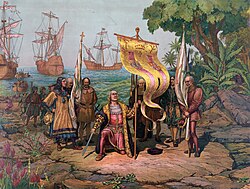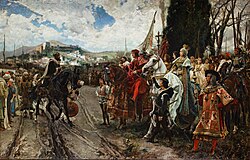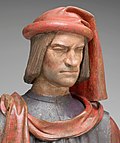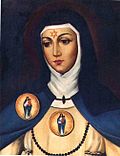1492
Lua error in package.lua at line 80: module 'Module:Ancient Olympiads' not found. 1492 (MCDXCII) was a leap year starting on Sunday of the Julian calendar, the 1492nd year of the Common Era (CE) and Anno Domini (AD) designations, the 492nd year of the 2nd millennium, the 92nd year of the 15th century, and the 3rd year of the 1490s decade. As of the start of 1492, the Gregorian calendar was 9 days ahead of the Julian calendar, which was the dominant calendar of the time. It was an important year in the history of the world.
| Millennium: | 2nd millennium |
|---|---|
| Centuries: | 14th century – 15th century – 16th century |
| Decades: | 1460s 1470s 1480s – 1490s – 1500s 1510s 1520s |
| Years: | 1489 1490 1491 – 1492 – 1493 1494 1495 |
The most important events centred around Spain. Muslim forces were finally expelled (sent away) from Spain. This ended 780 years of Muslim control in Al-Andalus.[1]
Jews were also expelled. With the backing of the King of Spain, Christopher Columbus set off on the voyage by which he would discover the "New World", by which was meant the Americas.
Fall of Granada: Muhammad XII, the last Emir of Granada, surrenders his city to the army of the Catholic Monarchs (Ferdinand II of Aragon and Isabella I of Castile) after a long siege.
These discoveries and changes made Spain a large empire, not just a country in Europe.
1492 Media
October 12 – Christopher Columbus arrives in the Americas from Spain.
January 2 – Muhammad XII, last Moorish Emir of Granada, surrenders his city to the army of Ferdinand and Isabella.
January 2 – Muhammad XII, last Moorish Emir of Granada, surrenders his city to the army of Ferdinand and Isabella.
Duchess Sabina of Bavaria
King Casimir IV Jagiellon
Saint Beatrice of Silva
References
- ↑ Elizabeth Nash (13 October 2005). Seville, Cordoba, and Granada: a cultural history. Oxford University Press, USA. p. 219. ISBN 978-0-19-518204-0.






